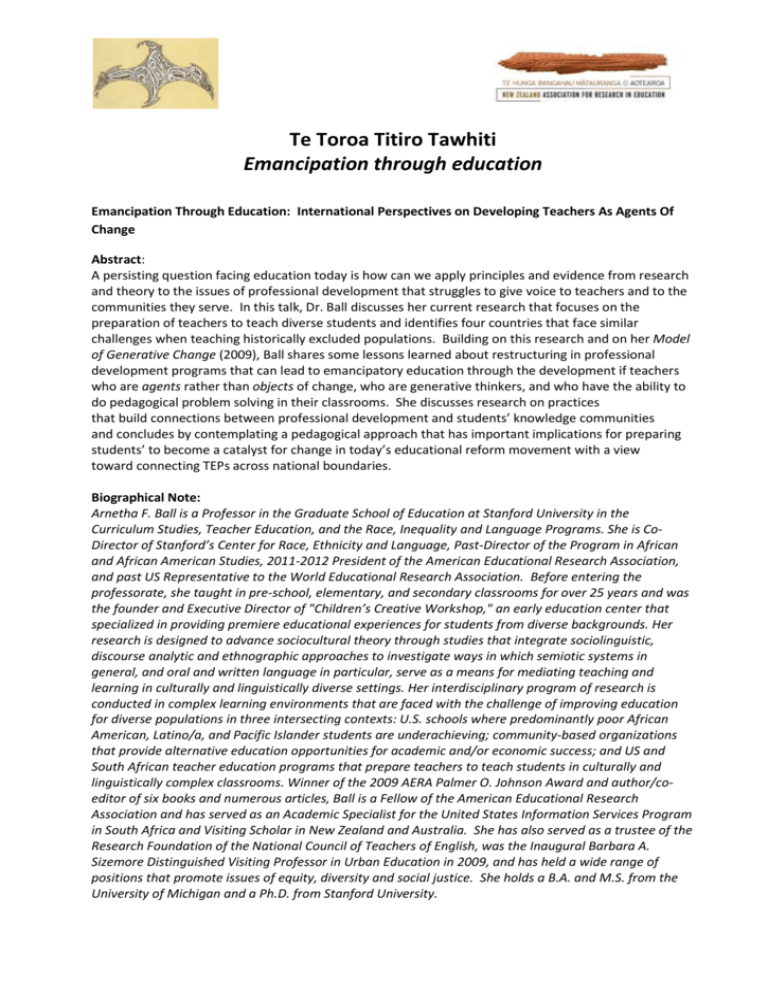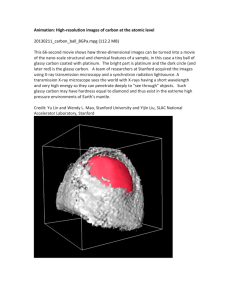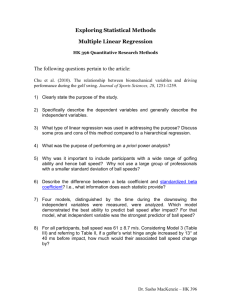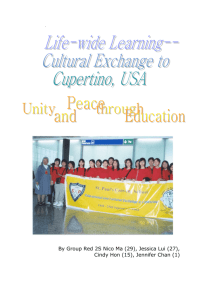Abstract Available here
advertisement

Te Toroa Titiro Tawhiti Emancipation through education Emancipation Through Education: International Perspectives on Developing Teachers As Agents Of Change Abstract: A persisting question facing education today is how can we apply principles and evidence from research and theory to the issues of professional development that struggles to give voice to teachers and to the communities they serve. In this talk, Dr. Ball discusses her current research that focuses on the preparation of teachers to teach diverse students and identifies four countries that face similar challenges when teaching historically excluded populations. Building on this research and on her Model of Generative Change (2009), Ball shares some lessons learned about restructuring in professional development programs that can lead to emancipatory education through the development if teachers who are agents rather than objects of change, who are generative thinkers, and who have the ability to do pedagogical problem solving in their classrooms. She discusses research on practices that build connections between professional development and students’ knowledge communities and concludes by contemplating a pedagogical approach that has important implications for preparing students’ to become a catalyst for change in today’s educational reform movement with a view toward connecting TEPs across national boundaries. Biographical Note: Arnetha F. Ball is a Professor in the Graduate School of Education at Stanford University in the Curriculum Studies, Teacher Education, and the Race, Inequality and Language Programs. She is CoDirector of Stanford’s Center for Race, Ethnicity and Language, Past-Director of the Program in African and African American Studies, 2011-2012 President of the American Educational Research Association, and past US Representative to the World Educational Research Association. Before entering the professorate, she taught in pre-school, elementary, and secondary classrooms for over 25 years and was the founder and Executive Director of "Children’s Creative Workshop," an early education center that specialized in providing premiere educational experiences for students from diverse backgrounds. Her research is designed to advance sociocultural theory through studies that integrate sociolinguistic, discourse analytic and ethnographic approaches to investigate ways in which semiotic systems in general, and oral and written language in particular, serve as a means for mediating teaching and learning in culturally and linguistically diverse settings. Her interdisciplinary program of research is conducted in complex learning environments that are faced with the challenge of improving education for diverse populations in three intersecting contexts: U.S. schools where predominantly poor African American, Latino/a, and Pacific Islander students are underachieving; community-based organizations that provide alternative education opportunities for academic and/or economic success; and US and South African teacher education programs that prepare teachers to teach students in culturally and linguistically complex classrooms. Winner of the 2009 AERA Palmer O. Johnson Award and author/coeditor of six books and numerous articles, Ball is a Fellow of the American Educational Research Association and has served as an Academic Specialist for the United States Information Services Program in South Africa and Visiting Scholar in New Zealand and Australia. She has also served as a trustee of the Research Foundation of the National Council of Teachers of English, was the Inaugural Barbara A. Sizemore Distinguished Visiting Professor in Urban Education in 2009, and has held a wide range of positions that promote issues of equity, diversity and social justice. She holds a B.A. and M.S. from the University of Michigan and a Ph.D. from Stanford University.











